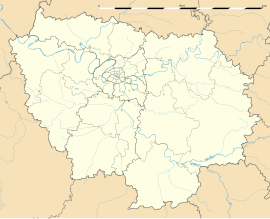|
Milly-la-Forêt
Milly-la-Forêt (French pronunciation: [miji la fɔʁɛ] ⓘ) is a commune in the Essonne department in the Île-de-France region in northern France. GeologyThe Forest of Fontainebleau, in the western end of which Milly-la-Forêt lies, is composed of the Oligocene Fontainebleau sands, which are a marine deposit, laid down in an intertidal zone. HistoryMilly-la-Forêt is the probable birthplace of Wulfram of Sens, Saint Wulfram; in about 640. Origin of the place nameThe first name of this domaine was called Maurillac in Gaul, Mauriliaco on a Merovingien coin, became Maureliacum, Melliacum in 667, Milliacum in Latin. The place name Milly is relatively current; it refers to an antic presence of a villa rustica owned during the Gallo-Romaine era by a certain Milius or Emilius. Hereby, the name was imported in 1080 by the knight Adam de Milly, originally from Milly-en-Beauvaisis and first lord of the place. But a charter dated from 651 mentioned already the name Melliacus. In the 13th century more accuracy was added to the place, Miliacum in Gastineto in 1267, which gave the name Milly-en-Gâtinais without being official. Upon a request from the municipal council and by a statutory order from 6 February 1948, the name was replaced by Milly-la-Forêt, considered at that time as the most touristic place and to differentiate it from its homonym Milly in Normandy. Population
The village Milly contains several facilities: such as the Collège Jean Rostand, the Conservatoire des Deux Vallées, a gymnasium and sports ground complex, a multimedia library, a swimming pool, a bus station, dealers in craft products and so on. There is a market every Thursday in the very impressive late medieval market hall, built in 1479.[4] The yearly calendar includes attic-clearing sales; at the opening of the summer holiday period, the town celebrates la Saint-Pierre, a fair is organised and there are several fairground rides and other attractions, as well as cultural stands for the sale of specialist food and craft products. Economy
Culture
Twin townsMilly-la-Forêt is twinned with the German town of Morsbach, situated in the valley of the Sieg to the east of Cologne and with Forest Row in East Sussex, England. Famous peopleMany popular characters are born, died or lived in Milly-la-Forêt:
References
External linksWikimedia Commons has media related to Milly-la-Forêt. All these links are in French (except for the second link which offers English, Spanish, German and French).
|
||||||||||||||||||||||||||||||||||||||||||||||||||||||||||||||||||||||||||||




